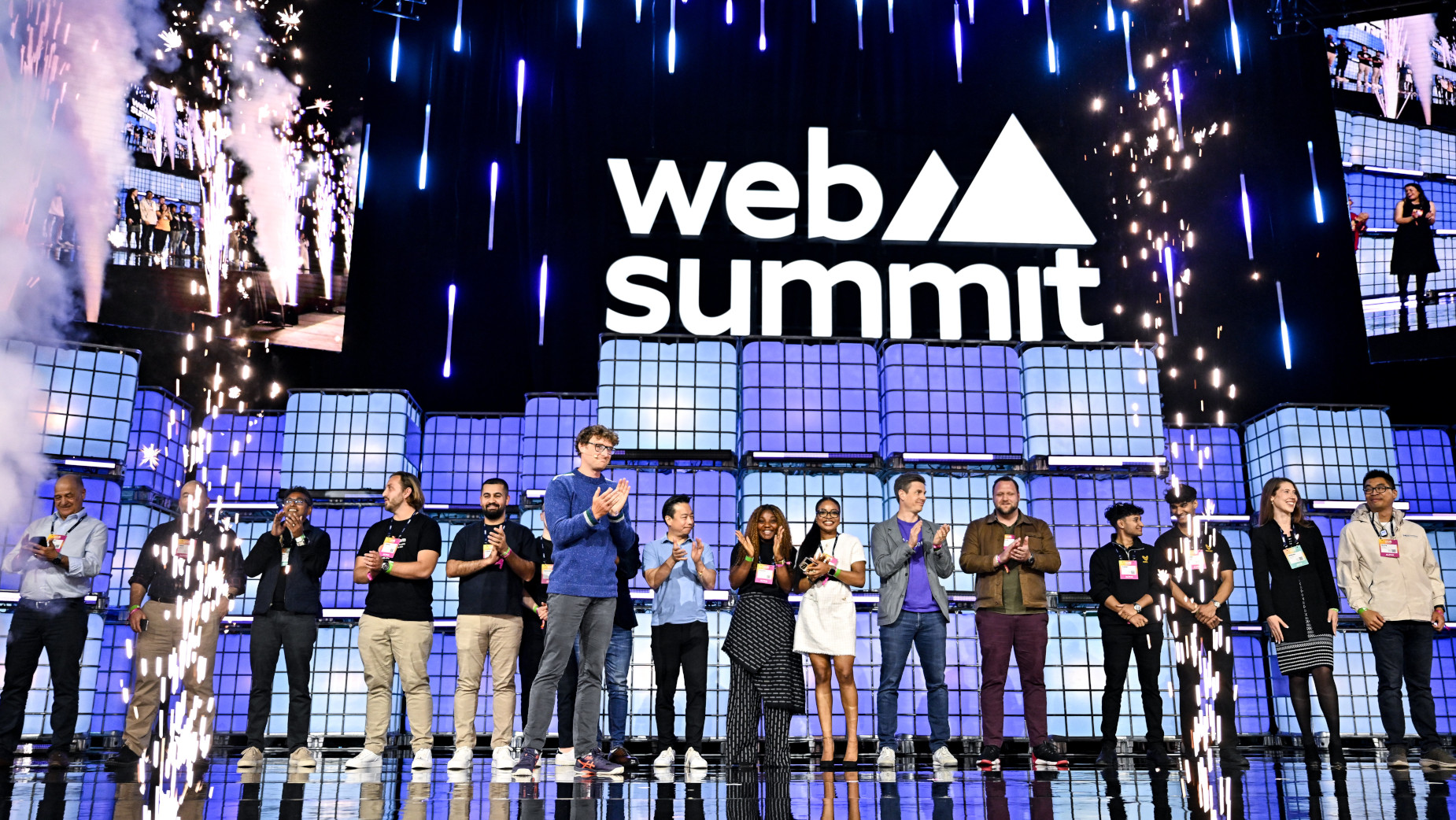
Inside Web Summit 2025: The Future of Tech, Trust and Brand Building

Caption: Paddy Cosgrave, CEO and founder, Web Summit, with startups, on centre stage during opening night at Web Summit Vancouver 2025 at Vancouver Convention Centre in Vancouver, Canada. Photo by Sam Barnes/Web Summit via Sportsfile
For four days at the end of May, global tech conference Web Summit took over the Vancouver Convention Centre, shining a spotlight on the city’s growing tech ecosystem and connections to the Americas, Asia and the Canadian West Coast. The international event saw Toronto pass the baton to the West Coast, making it the first Web Summit in North America and a big moment for the city.
For events such as this, ‘conference’ does not do the gargantuan arrangement justice. Individuals and teams from a broad scope of industries travelled from as far as Italy, India, Nigeria, Poland, Portugal, and Ukraine to take part in what Forbes has called “the best tech conference on the planet.” With 15,000 international educators, entrepreneurs, business leaders, and investors in attendance, and more than 150 world-leading partner companies like Microsoft, IBM, DELL, MasterCard, Snapchat and Figma, the diversity of this year’s event demonstrated Web Summit’s wide-reaching influence.
Promising deep insights for those in advertising and marketing, as well as AI and machine learning, gaming, health, wellness, financial services, SaaS, sustainability and cleantech, LBB’s North America features lead, April Summers went along to get the lowdown.

Photo by Sam Barnes

Photo by Ramsey Cardy

Photo by Vaughn Ridley
Tariffs and Trust
As one would expect, tariffs were a hot topic during the summit. One particularly interesting and somewhat refreshing take came from Canadian economist William Lazonick, who took to the stage for ‘Tariffs, tech and the trouble with value’.

Caption: William Lazonick, professor of Economics Emeritus, University of Massachusetts, on centre stage during day two of Web Summit Vancouver 2025 at Vancouver Convention Centre in Vancouver, Canada. Photo by Sam Barnes/Web Summit via Sportsfile
Lazonick unpacked the historical role of tariffs in the 19th century, particularly in the US, as a means to develop domestic industries, while dismissing Trump’s tariffs as outdated and ineffective. He pointed out that while tariffs were once important for revenue and industry development, they are less relevant today. Highlighting the potential for other countries to benefit from the US' restrictive policies, he urged Canada to “take advantage of this situation, as many European countries are.”
Another panel session that dove into the impact of tariffs, and the wider issue of consumer trust, was ‘Brands in Uncertain Times: The Citizen Consumer Project’. Taking to the stage to discuss the rising anti-American sentiment, trade wars and declining consumer confidence was entrepreneur and sociologist, Angus Reid, and FCB global CEO, Tyler Turnbull.
Diving into the findings of the FCB and Angus Reid Group’s new Citizen Consumer Project, the pair emphasised the declining trust in government and the rise of consumer activism, highlighting that many Americans and Canadians are now choosing to express political views through purchases.
“We have around 50% of Americans and Canadians saying, I vote, not too much at the ballot box, but at the cash register,” said Angus. “So, brands become one of the few outlets in which people – in a very confused society where they feel left out – can somehow make themselves known and felt.”
Despite cost of living being by far the number one issue for Canadians and Americans, Tyler revealed that the new study found that Canadians are willing to pay 20 to 30% more for products that are produced, sourced and made in Canada. Looking at these findings from a brand building perspective, the CEO pointed out, “There's a deeper need to be more authentic if you're a Canadian brand specifically, but also be more cautious if you're a multinational US brand with a big presence in Canada.”

Caption: Tyler Turnbull, global CEO, FCB Global, on Creative Summit stage during day two of Web Summit Vancouver 2025 at Vancouver Convention Centre in Vancouver, Canada. Photo by Ramsey Cardy/Web Summit via Sportsfile
Wrapping up the panel, Tyler predicted that this trend of buying and supporting Canadian brands will continue, particularly in the grocery category, where consumers are making more informed purchasing decisions. Angus concluded that leveraging consumer pride in branding strategies will continue to be of crucial importance throughout 2025 and beyond.
But the economic landscape wasn’t the only concern – audiences were equally tuned in to how these shifts are reshaping the marketer’s toolkit.
Marketing to the Modern Consumer
As those in this sector of the industry know all too well, consumer attention is more fragmented than ever, as old agency frameworks continue breaking down. Discussions on the state of play of marketing highlighted the significant role of AI, with one keynote speaker touching on how over 80% of marketing content is expected to be AI-generated by 2030.
During a ‘Marketing in 2025’ panel discussion hosted by Janice Min, CEO and editor-in-chief at The Ankler, speakers Joey Camire, CEO at SYLVAIN, and Charlotte Mostaed, CMO at Health-Ade, emphasised the need for brands to diversify their marketing strategies beyond social media to build deeper consumer connections and shake things up.

Caption: Charlotte Mostaed, CMO, Health‑Ade; Joey Camire, CEO, SYLVAIN; Janice Min, CEO and editor-in-chief, The Ankler, on centre stage during day two of Web Summit Vancouver 2025 at Vancouver Convention Centre in Vancouver, Canada. Photo by Sam Barnes/Web Summit via Sportsfile
Discussing the strategy behind Health-Ade’s in-person giveaways and experiential efforts, Charlotte explained, “It’s about building a portfolio of reach opportunities, because people are putting away their phones and they're looking to interact with brands in a different way, and there's still a great deal of storytelling we need to do.”
Also advocating for real-life experiences, Joey admitted that while social feeds are important, consumers are being inundated with content, making it harder to stand out.
Citing the involvement of influencers in experiential and social marketing strategies, he stated, “Historically, if you use a celebrity in a commercial, there was an understanding that they were a spokesperson. I think where it starts to get blurry is when you go into these influencers who are conveying they use a product. That question of what is true and real all starts to get blurry and can potentially tarnish a campaign.”
Talk of the growing importance of consumer events and experiences was prevalent across multiple panel sessions and speeches at Web Summit. According to leaders across industries, the seismic shift brought about by AI has resulted in a rise in the popularity of in-person experiences, with these opportunities not playing a very significant role in business. Despite the growing interest in AI and virtual technologies, marketers are observing that the key to brand building is happening beyond the scroll-through.
SEO Is Out, GEO Is In
In a world where nearly every purchase decision starts with a search engine, a new way of thinking about discoverability has surfaced. With SEO-driven KPIs being a mainstream business concern since the early 2010s – companies are somewhat obsessively monitoring the most powerful and cost-effective ways to drive traffic, build visibility, and grow revenue online – it would appear ‘AI mode’ is now at the top of Google search.
As we shift towards more AI-driven interactions, Google’s search is undergoing a major shift that will change the way content is optimised for search results. Jim Louderback, editor and CEO at Inside the Creator Economy, calls it GEO: Generative Engine Optimisation.

Caption: Jim Louderback, editor and CEO, Inside the Creator Economy, on New Media Summit stage during day three of Web Summit Vancouver 2025 at Vancouver Convention Centre in Vancouver, Canada. Photo by Sam Barnes/Web Summit via Sportsfile
And according to Jim, it's not just text – it’s multimodal. “When you ask ChatGPT or Google Gemini something, it's a discussion, and the things that it surfaces are very different from what Google's actual search engine does. If you want to take your video content, your text content, whatever, and get it surfaced in this new version of search, you have to think about the trusted AI, and how you get it to think about your content as being authoritative and interesting.”
ColdStart, a leader in the burgeoning realm of GEO and AI-powered audience growth, had its own booth at the Exhibition level of the summit. This is where I met CEO Brandon Teller and his team, who use tools like auto-generated sitemaps and multimodal formatting to automate and optimise content in a way that aligns with how AI engines crawl and present information.
From the sounds of it, more and more companies like ColdStart will be entrusted with the technical backend aspects of making content discoverable in GEO ecosystems like ChatGPT and Gemini, so that advertisers and marketers are able to focus on strategy and storytelling.
Beyond Hollywood: Film in 2030
On the final day of the Web Summit, the highly deliberated subject of the future of filmmaking was addressed by four film and media specialists: Brian Newman, founder of Sub-Genre; Tod Plotkin, founder and CEO at Green Buzz Agency; David Bloom, senior contributor at Forbes; and Dana Harris-Bridson, senior VP/editor-in-chief at IndieWire.

Caption: Speakers, from left, Brian Newman, founder, Sub-Genre; Tod Plotkin, founder, CEO, Green Buzz Agency; Dana Harris-Bridson, senior VP/editor in chief, IndieWire; and David Bloom, senior contributor, Forbes, on New Media Summit stage during day three of Web Summit Vancouver 2025 at Vancouver Convention Centre in Vancouver, Canada. Photo by Sam Barnes/Web Summit via Sportsfile
Advocating for more transparency of the crossover point between tech and film, Dana launched IndieWire’s new vertical, ‘The Future of Film’, to navigate the chaos. Discussing the importance of maintaining the human component in films, despite the advancements in AI, she said, “One of the reasons I started future filmmaking was because we wanted to cover AI – that was actually my initial focus. It's something that's slowly seeing more acceptance: Darren Aronofsky has been doing more stuff with it, Natasha Leone is making an AI movie. It's going to be a slow burn because however the films are made, no one's going to watch them unless they are human films.”

Caption: Dana Harris-Bridson, senior VP/editor in chief, IndieWire, on New Media Summit stage during day three of Web Summit Vancouver 2025 at Vancouver Convention Centre in Vancouver, Canada. Photo by Sam Barnes/Web Summit via Sportsfile
Exploring the much-discussed role of AI in future filmmaking, Tod told the audience about the importance of training the workforce to use new technologies, such as AI and virtual production tools. He revealed the efficiency gains from AI in production, noting how it saves 20% on pre- and post-production tasks, such as generating images and fixing aesthetic issues, creating more content quickly.
The topic of trust came up again in this session too, this time in relation to values in brand content and the power they yield. Brian revealed that major brands like outdoor retailer REI are shifting from branded content to real movies, funding films and capitalising on their vast membership base. “REI has 30 million members. They trust that brand, and when that brand brings out content to them, people want to see it. The film space is getting more crowded every minute, so working with a trusted partner is key – it’s a way to cut through the noise.”
To close, all four panelists agreed on a clear need for continuous learning and up-skilling in order to stay sharp in the ever-changing landscape of filmmaking. Overall, however, there was an air of optimism about the future, with all pointing out that innovation, collaboration, and long-term planning are crucial in adapting new business models and technologies in a thriving film industry.

Caption: Attendees at Centre Stage at Web Summit Vancouver 2025 at Vancouver Convention Centre in Vancouver, Canada. Photo by Ramsey CardyWeb Summit via Sportsfile.jpg
Read more about FCB and Angus Reid’s Citizen Consumer Project here…
Read more from LBB’s North America features lead April Summers here…















